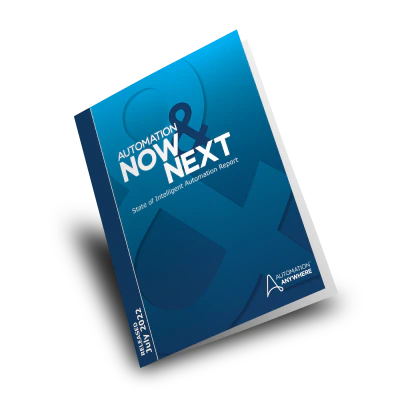- Login
- Search
- Contact Us
-
Have a question? Our team is here to help guide you on your automation journey.
-
Explore support plans designed to match your business requirements.
-
How can we help you?
-
- AI
AI Without the Hype From pilot to full deployment, our experts partner with you to ensure real, repeatable results. Get Started
- Automation Anywhere AI
-
- Solutions
Featured Agentic Solutions
Accounts Payable Invoice automation—No setup. No code. Just results. Accounts Payable
Customer Onboarding Scale KYC/AML workflows. Customer Onboarding
Customer Support Keep queues moving, even at peak load. Customer Support
Healthcare RCM Revenue cycle management that runs itself. Healthcare RCM
- Products
Platform Features
- Agentic process automation (APA)
- Robotic Process Automation (RPA)
- View all Products
-
- Resources
Get Community Edition: Start automating instantly with FREE access to full-featured automation with Cloud Community Edition.
Featured
 Named a 2025 Gartner® Magic Quadrant™ Leader for RPA.Recognized as a Leader for the Seventh Year in a Row Download report Download report
Named a 2025 Gartner® Magic Quadrant™ Leader for RPA.Recognized as a Leader for the Seventh Year in a Row Download report Download report- Become an Expert
- Developer Tools
- Get Support
- View all resources
-
- Partners
Find an Automation Anywhere Partner Explore our global network of trusted partners to support your Automation journey Find a Partner Find a Partner
- Find a Partner
- For Partners
-
What is Digital Acceleration?
Digital acceleration is the strategic process of leveraging digital technologies, methodologies, and capabilities to rapidly transform business operations, enhance customer experiences, and drive innovation.
Businesses have always understood the need to be flexible and adapt to change. However, many underestimated just how flexible they would need to be when the Coronavirus swept the globe. Organizations scrambled to transition to remote workforces, contactless delivery, and in some instances, pivot to entirely new business models. Many struggled to streamline workflows and make their data accessible when and where they needed to. The result? The birth of digital acceleration and the widespread adoption of digitized process management.
Technologies such as cloud services, mobile technology, Machine Learning (ML), and Artificial Intelligence (AI) have driven the automation and digitization of critical business processes while providing new insights and opportunities. Businesses can achieve more once they've switched focus to digital acceleration and embraced newer technologies.
What can digital acceleration do for me?
How businesses adopt new technologies will determine how they benefit from the practice. Here are a few common advantages of business process digitization and digital acceleration:
 Future-Proofing
Future-Proofing
COVID will not be the last drastic change in the digital world or the business one. Consumer behavior can also drastically change the business ecosystem with the arrival of new technologies and societal trends. Companies that want not just to survive but thrive in their new environment must learn to adapt quickly during periods of uncertainty.
 Innovation
Innovation
Digital acceleration empowers businesses by providing access to real-time data, new methodologies, and metrics, which paves the way to identifying new opportunities. Therefore, companies that embrace technology early and are flexible enough to adapt will be uniquely positioned to offer something their competitors can't.
 Financial Savings
Financial Savings
Traditional software doesn't play well with modern business needs and processes. The information is often challenging to work with. It requires expensive software development, and it doesn't always make it easy for organizations to adapt to modern business practices. Digital acceleration is a low-cost, high-ROI solution to these issues.
 Scalability
Scalability
As businesses grow and expand to include new opportunities, their technology often gets in the way. It can't scale. Or, at least, it can't scale at the speed of business. New digital technologies such as cloud services allow businesses to scale up without significant interruptions or complex transitions.
 Reduce Labor Costs
Reduce Labor Costs
Currently, many highly skilled employees lose hours each day to repetitive, manual tasks that newer software and automation technology could be doing for a much lower cost.
 Improved Decision-Making
Improved Decision-Making
Businesses make the best decisions they can with the information available to them at the time. If data is incomplete, fragmented, or missing, they can't inform decisions. They might even bias information and contribute to costly mistakes. Data acceleration centralizes and integrates information, making it easier to generate reports, assess the impacts of changes, and even identify new products and services previously obscured by data silos.

A must read, one-of-its-kind, industry report
Learn how top performers achieve 8.5x ROI on their automation programs and how industry leaders are transforming their businesses to overcome global challenges and thrive with intelligent automation.
Who uses digital acceleration?
Businesses and organizations in almost every industry have adopted digital acceleration. Some of these include:
 Banking
Banking
Banking and credit unions began their digital transformation long before COVID, but they've swiftly adapted to digital acceleration in its wake. These organizations have greatly expanded their services via cutting-edge mobile apps, investment services, and new, modern, online banking platforms.
 Telecommunications
Telecommunications
Changing customer service demands in the telecommunications industry drove this industry's move to digital acceleration. Market leaders have adopted many new technologies, including chatbots and intelligent agents, to answer customer questions and triage responses. They also worked with other industries to provide customers with new digital platforms such as telehealth.
 Insurance
Insurance
Insurtech and fintech companies embraced new digital initiatives by rapidly grabbing data from cloud sources and analyzing it with machine learning and AI to provide quotes and process claims in a fraction of the time. It increased profitability, functionality, and customer retention.
 Healthcare
Healthcare
Digital transformation initiatives have allowed healthcare companies to digitize their efforts. Many now use video streaming and mobile apps to remotely diagnose and prescribe treatments. They can also onboard patients, update patient records, and communicate with stakeholders instantly.
 E-commerce
E-commerce
E-commerce businesses with the know-how and willingness to take risks have reaped the rewards associated with digital acceleration. It's fully integrated into their operating model. Some examples of this include suggestion engines, AI-driven marketing campaigns, and the early adoption of services such as cloud hosting and SaaS models.
 Professional Services
Professional Services
Psychologists, lawyers, and many other professionals have all adopted new digital business models. Those who hadn't quickly moved online at the start of the pandemic. Today, they've taken advantage of new opportunities to expand their customer offerings to new products and services they would never have considered previously.
Frequently asked questions about digital acceleration
Not exactly. Digital transition, as most businesses know it, involves transforming one digital process at a time as they have the time, the capital, or a high enough ROI to do so. It's a short-term goal as opposed to a long-term journey.
Digital acceleration is a business strategy that guides the company's future. It shifts the focus from digitizing a process to adopting the latest technologies, such as automating business processes, data visualization, ML, and AI. Instead of a final goal or endpoint, it's constantly striving to gain from the newest options and watching what is coming.
Many businesses embraced the digital transition by making significant infrastructure investments only to fall short of their goals. There are plenty of reasons why this might happen, but confounding factors are frequently the problem.
Business processes and infrastructure rely extensively on each other. A process might seem insignificant, but it can have a significant impact across the organization in practice. So, the benefits of upgrading infrastructure might not appear until after the related processes change. Digital acceleration works the opposite way for that reason.
Instead of massive changes and investments upfront, digital acceleration focuses on making a series of smaller steps that have more significant benefits overall. Why? You can see the advantages almost immediately, and any risks or costs will be insignificant. Minor changes tend to cause little interference, and together, these benefits motivate subsequent transitions.
When you start adopting a digital acceleration paradigm, you begin with minor changes. These changes rarely require an engineer or tech team to implement. You can automate business processes such as transferring data to and from CSV files, for example, through a user-friendly interface. You can set them up yourself or purchase pre-made bots.
Smaller technologies like Robotic Process Automation (RPA) have another significant advantage: Because they don't require highly skilled automation experts, almost anyone in the organization can create and deploy their bots. Your business can make several changes, in a short time, without placing all the pressure on one individual or department.
Every business has unique needs, sensitivity to change, and is impacted by technology in different ways. So, no, unfortunately, no single guide or strategy will contain all the answers. To get the most from your digital transformation efforts, look within your organization and work with everyone to create a winning digital strategy.
Examine the entire business process to identify pain points--manual, repetitive processes that require a significant amount of time. Then, arrange them into a strategy that works best for the company and the people within it. These processes and systems will relieve the most pressure, create the least amount of disruption, and have the most noticeable benefits.
C-suite professionals understand that new and emerging startups have and will continue to be a threat. Digital maturity won't keep organizations in the lead for long. The only way for traditional and digital businesses to stay ahead is to continue innovating, improving existing business processes, and seeking new opportunities.
Digital acceleration keeps businesses agile enough to adapt quickly when new threats or opportunities appear, providing the information and insights necessary for intelligent innovations. In short, technology is as much about keeping up with competitors and improving existing business practices as it is about growth and future success.
As you begin to adopt new technologies, the rest of the business will change around it. Eventually, you will have to adjust job descriptions and staffing levels. If you needed five people in strict HR roles, you might only need four in traditional HR roles. You will eventually need in-house technology experts or dedicated automation engineers to manage software upgrades, networks, and other IT-related problems.
Another change to be aware of is that your current offerings may also change. With increased digital capabilities, you might decide to offer online training, subscriptions, or another digital feature not possible before the transition. Alternatively, you might attract new customers who require different services for a superior customer experience.
How do I get started with digital acceleration?
Digital acceleration begins with a plan. Look for minor changes that will have the most immediate impact, such as a new communication tool or one of Automation Anywhere's RPA bots. Then, determine how much time the new process will take to implement, how much time it will save, and when it would be most convenient for your business to test and adopt the latest technology.
Once you've deployed the new technology, step back, analyze the entire process from start to finish, measure the results, and identify what worked and what didn't. Improve the transition procedure and repeat the investigation until you're satisfied. Then, move on to the next small step in your digital acceleration journey and start again.
Explore additional resources

For Students & Developers
Start automating instantly with FREE access to full-featured automation with Cloud Community Edition.
